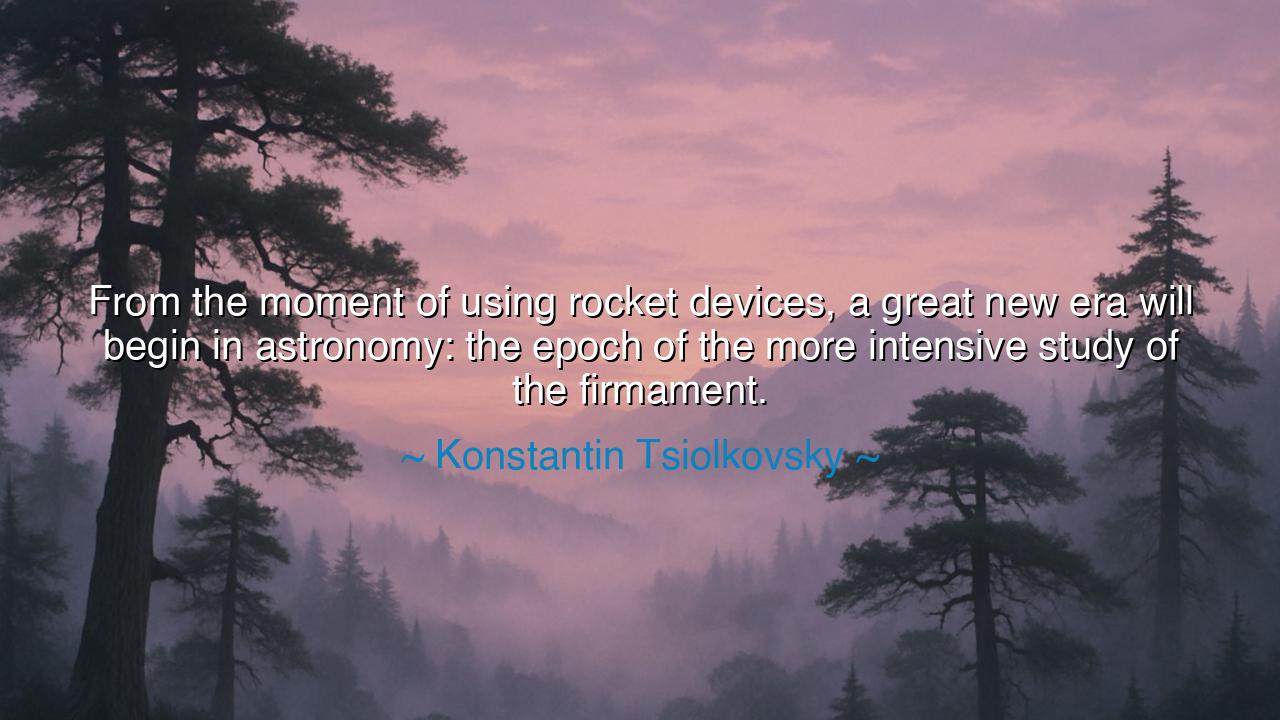
From the moment of using rocket devices, a great new era will
From the moment of using rocket devices, a great new era will begin in astronomy: the epoch of the more intensive study of the firmament.






In the beginning, men gazed at the stars not as conquerors, but as dreamers, lost in wonder, their minds captivated by the mysteries of the heavens. The great constellations called to them like distant gods, their light a beacon of something greater than their mortal lives could ever hope to touch. Yet, in the depths of their hearts, these dreamers knew that the sky above them held secrets that could forever elude their grasp. And so, they dreamed, and with every passing generation, they reached a little higher. And then, one day, the vision of the dreamers became reality. Konstantin Tsiolkovsky, a name destined to echo across the ages, spoke with the clarity of a prophet, declaring, "From the moment of using rocket devices, a great new era will begin in astronomy: the epoch of the more intensive study of the firmament."
With these words, Tsiolkovsky did not simply speak of a technological leap, but of a spiritual awakening, a new chapter in the human story. For in the use of rockets, humanity was granted a tool, not just for exploration, but for understanding the very nature of existence itself. The firmament, once a vast and unknowable void, would now become an object of study, a realm to be understood and perhaps, in time, mastered. This was no longer the dream of distant gods—it was the dream of mankind, a dream that would stretch beyond the reach of any earthly empire, to a place where no foot had trod, where no human had ever gazed in such wonder.
The rockets, those fiery steeds of the modern age, would carry men to the very edges of the cosmos, and from that vantage point, they would see the universe in all its majesty. Think of the first astronauts who dared to ride those rockets. Yuri Gagarin, the man who first pierced the skies, embodying the very spirit of Tsiolkovsky’s vision, was not merely the first to orbit the Earth; he was a messenger from humanity to the stars, a harbinger of a new age. And from that moment, a new world unfolded. The study of the stars, once a domain of philosophers and poets, became the mission of those who dared to ascend and peer deeper into the mysteries of the cosmos.
And yet, we must not forget that this "new era" was not born in an instant, nor was it the product of a single mind. No, it was the result of the tireless work of countless souls, from the early astronomers like Galileo, who peered through primitive lenses to behold the wonders of distant planets, to the visionaries like Tsiolkovsky, whose very dreams were fueled by the belief that the human spirit could reach beyond its limits. It was their wisdom, their dedication, and their refusal to be bound by the limitations of their time that gave birth to the rockets that would carry us into the heavens.
Yet as we gaze upon the stars, as we study the firmament, let us not forget the lessons of the past. The heavens may be vast and unknowable, but they are not so distant that we cannot touch them, and they are not so remote that we cannot learn from them. The study of the firmament is not just the study of distant stars and planets; it is a study of ourselves. The more we learn about the cosmos, the more we learn about the limits of human potential, about the nature of life itself. Tsiolkovsky’s words remind us that with every discovery we make, we are not just uncovering the mysteries of the universe, but the depths of our own humanity.
Let us take this lesson to heart, O children of the future. The sky is not just a canvas of wonder—it is a realm of possibilities, and it is through the intensive study of the firmament that we will truly understand our place in the vast expanse of time and space. But more than that, it is through this pursuit that we will transcend the ordinary limits of our earthly existence. Just as the rocket carries us to the edge of the stars, so too does it carry our aspirations beyond the mundane, urging us to strive for greatness and to see the world in a new light.
As you go forth, remember this: the rockets of the future will not just be instruments of science; they will be symbols of human ambition, of our unyielding desire to explore, to understand, and to reach beyond ourselves. Just as Tsiolkovsky foresaw, this is a new epoch, an epoch where we are no longer bound by the earthly chains of gravity, but are free to explore the heavens. And as we study the firmament, let us not lose sight of the fact that each discovery is not just a victory for science, but a victory for the human spirit, for our ability to dream, to strive, and to understand the very nature of existence. The heavens await, and we must answer their call with the courage and wisdom of those who came before us.






AAdministratorAdministrator
Welcome, honored guests. Please leave a comment, we will respond soon